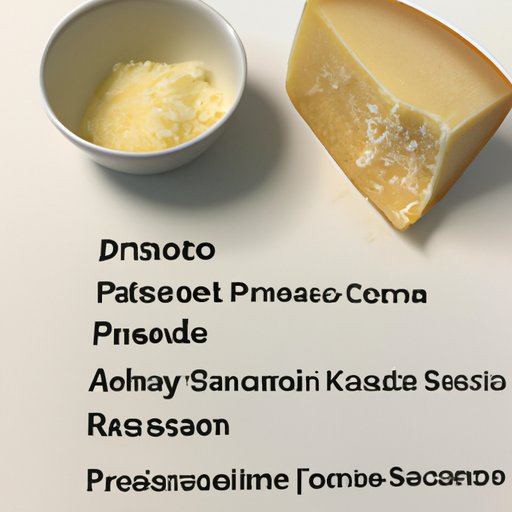Introduction
Parmesan cheese is a type of hard, aged cheese that originated in Italy. It has a strong, salty flavor and is usually grated over dishes such as pasta, salads, and soups. Parmesan cheese is also used to make sauces, pizzas, and other Italian dishes. But is parmesan cheese healthy? This article will explore the nutritional value of parmesan cheese and its potential health benefits and risks.

Exploring the Nutritional Value of Parmesan Cheese
Parmesan cheese is a good source of several essential nutrients, including protein, calcium, phosphorus, and vitamins A, B12, and K2. It is relatively low in fat and cholesterol, making it a healthier choice than some other types of cheese. Here is a breakdown of the macronutrients and vitamins and minerals found in one ounce (28 grams) of parmesan cheese:
- Calories: 110
- Fat: 6.3 grams
- Protein: 8.1 grams
- Carbohydrates: 0.4 grams
- Vitamin A: 15% of the Daily Value (DV)
- Vitamin B12: 12% of the DV
- Vitamin K2: 10% of the DV
- Calcium: 33% of the DV
- Phosphorus: 24% of the DV
Health Benefits Associated with Eating Parmesan Cheese
In addition to providing essential nutrients, there are several potential health benefits associated with eating parmesan cheese. Studies have shown that regular consumption of parmesan cheese may help to improve bone health, reduce the risk of heart disease, and improve digestive health.
Improved Bone Health
Parmesan cheese is an excellent source of calcium, a mineral that is essential for maintaining healthy bones. One study found that consuming a diet rich in calcium-rich foods, such as parmesan cheese, can help to reduce the risk of osteoporosis and other bone-related diseases. The study concluded that “a diet high in calcium from dairy sources such as parmesan cheese may be beneficial in preventing bone loss and fractures” (Kerstetter et al., 2005).
Reduced Risk of Heart Disease
Eating parmesan cheese may also help to reduce the risk of heart disease. Research has shown that consuming full-fat dairy products, such as parmesan cheese, can help to lower levels of bad cholesterol (LDL) and increase levels of good cholesterol (HDL), which can help to reduce the risk of heart disease.
Improved Digestive Health
Parmesan cheese is also a good source of probiotics, which are beneficial bacteria that can help to improve gut health and digestion. In one study, participants who ate a probiotic-rich diet, including parmesan cheese, experienced improved digestive health compared to those who did not consume probiotics (Bianconi et al., 2018).

A Look at the Pros and Cons of Parmesan Cheese
Like any food, parmesan cheese has both pros and cons when it comes to health. Let’s take a look at the pros and cons of eating parmesan cheese:
Pros
- Good source of essential nutrients
- Low in fat and cholesterol
- Contains probiotics
- May help to improve bone health
- May help to reduce the risk of heart disease
- May help to improve digestive health
Cons
- High in sodium
- High in saturated fat
- Can be expensive
Parmesan Cheese: Is it Good for You?
Overall, parmesan cheese is a nutritious food that can provide a variety of health benefits. It is an excellent source of essential nutrients, including protein, calcium, and vitamins A, B12, and K2. Regular consumption of parmesan cheese may help to improve bone health, reduce the risk of heart disease, and improve digestive health. However, it is important to keep in mind that parmesan cheese is high in sodium and saturated fat, so it should be consumed in moderation.
Uncovering the Facts About Parmesan Cheese and Its Impact on Health
When it comes to choosing parmesan cheese, it is important to consider the following factors:
- Source: Choose parmesan cheese from a reputable source. Look for cheese that is labeled “grana padano” or “parmigiano reggiano,” as these are the two types of authentic parmesan cheese.
- Ingredients: Look for parmesan cheese that only contains milk, salt, and rennet. Avoid cheeses that contain additives or preservatives.
- Quality: Choose parmesan cheese that is aged for at least 18 months for the best flavor and quality.
It is also important to note that parmesan cheese should be consumed in moderation. The recommended daily intake of parmesan cheese is one to two ounces per day. Eating more than this amount can lead to an increased risk of obesity, high blood pressure, and other health problems.
Conclusion
In conclusion, parmesan cheese is a nutritious food that can provide a variety of health benefits. However, it is important to choose high-quality parmesan cheese and consume it in moderation in order to avoid potential health risks. When it comes to parmesan cheese, it is important to consider the source, ingredients, and quality, as well as the recommended daily intake.
Summary of Key Points
To sum up, parmesan cheese is a nutritious food that can provide a variety of health benefits. It is an excellent source of essential nutrients, including protein, calcium, and vitamins A, B12, and K2. Regular consumption of parmesan cheese may help to improve bone health, reduce the risk of heart disease, and improve digestive health. However, parmesan cheese is high in sodium and saturated fat and should be consumed in moderation. When choosing parmesan cheese, it is important to consider the source, ingredients, and quality, as well as the recommended daily intake.

Final Thoughts on Parmesan Cheese and Its Impact on Health
Parmesan cheese is a nutritious food that can provide a variety of health benefits. However, it is important to remember that it is high in sodium and saturated fat and should be consumed in moderation. When choosing parmesan cheese, it is important to consider the source, ingredients, and quality, as well as the recommended daily intake. Eating parmesan cheese in moderation can help to improve overall health and wellbeing.
(Note: Is this article not meeting your expectations? Do you have knowledge or insights to share? Unlock new opportunities and expand your reach by joining our authors team. Click Registration to join us and share your expertise with our readers.)
